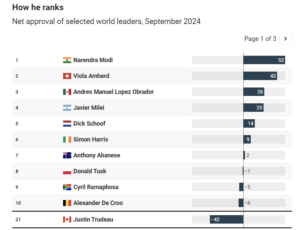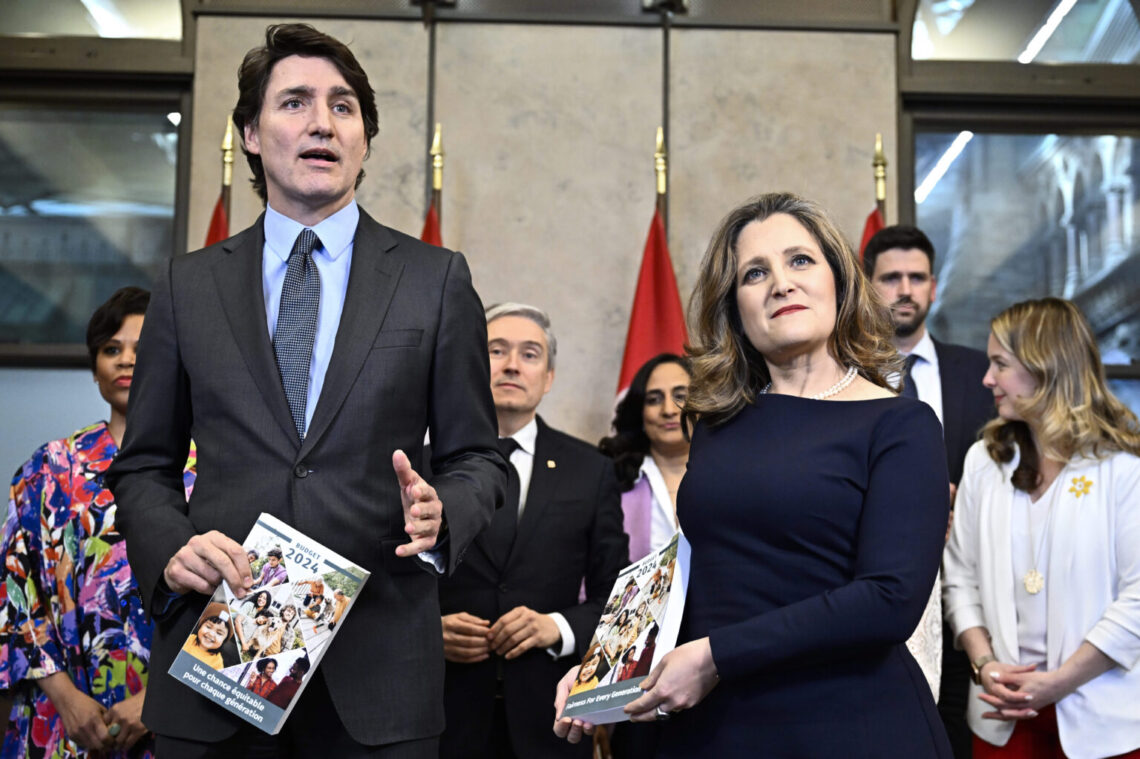Justin Trudeau’s Liberal Party has won every election in Quebec since World War II, until now. But during the election a month ago, the separatists Bloc Québécois took a surprise victory.
“It hurt to vote against my party, but it sends a message to Trudeau: We’re done with you, and we’re done with the Liberals, unless something changes,” Altimas (43) told The Times.
A maths teacher who voted for the Bloc Québécois, he has only one thing to say to Trudeau: Good riddance!
This is a signal that Trudeau’s term is coming to an end. There will be a general election next autumn, and it will take almost a miracle for Trudeau’s party to emerge victorious.
Trudeau, the progressive darling of particularly left-wing women in the West, is now extremely unpopular at home, in fact he has far less support than Biden.

Interestingly, Norways Prime Minister Jonas Gahr Støre is also less popular than Biden (17th place with minus 25 per cent net support versus 11th place with minus 17 per cent net support.
Despite his massive unpopularity at home, Trudeau remains popular in other countries. According to a recent YouGov poll, he remains the most liked politician in the world outside his own country after Ukrainian President Zelensky.
Trudeau promised to create a “Canadian Dream”. But the dream eventually turned into a nightmare. Trudeau opened the floodgates to mass immigration without the necessary infrastructure in place.
As a result, homeless camps have sprung up, crime has exploded, house prices have skyrocketed, the green shift is pushing up energy prices, and inflation on essential goods such as food has been hit by soaring inflation.
The public healthcare system is in crisis, as it wasn’t prepared for one million new customers last year, the number of migrants the Trudeau regime allowed into the country in 2023. Immigrants are also more likely to need medical attention than the indigenous population.
Across cities like Ontario, Vancouver and Toronto, drug addicts are littering the streets at a level reminiscent of big cities in California.
Topping it all off is the tyranny that Trudeau’s government inflicted on its citizens during the pandemic.
When the truckers had had enough, the government used emergency laws, even though the truckers weren’t violent and certainly didn’t pose a threat to national security. In January this year, this was declared unconstitutional by a federal court in Canada.
The tyranny went so far as to confiscate volunteer funding for truckers, while many truckers had their bank accounts frozen.
Everything was run with a heavy hand by Trudeau’s Deputy Prime Minister Chrystia Freeland, who also happens to sit on the board of the World Economic Forum.
Richard Bisaillon, professor of political science at Concordia University in Montreal, believes Trudeau and his party are no longer concerned with the so-called kitchen table issues, the day-to-day problems that preoccupy ordinary people.
“The Liberals’ fight for social justice, their crusade against climate change, gun control and other issues that resonate with the upper-middle class, have lost touch with the issues that matter to middle-class and lower-middle-class families: the cost of living, inflation, the cost of housing and the availability of health care,” says Bisaillon.
“There’s a growing disconnect with what concerns most Canadians.”
This is something that characterises the political class throughout the West at the moment, but Canada tops the list along with countries like Norway, Sweden and New Zealand. But New Zealand has got rid of its tyrant, Jacinda Ardern, and even in Sweden there are signs of a growing understanding of the causes of the massive problems. But Norway and Canada is an entirely different story.
Trudeau is infected by the same diseases that have afflicted the vast majority of Western politicians. He wants peace and a ceasefire in the Middle East, and wants Israel to limit its reactions after being attacked. He has only positive things to say about Islam. He knelt for Black Lives Matter and celebrates the LGBTQ2S+ mob as often as he can.
Most things have gone wrong for Trudeau since the pandemic began. His party lost the 2021 election but retained power by forming a minority government. Even his wife has left him in favour of a paediatric surgeon from Ottawa.
Trudeau withdrew part of the carbon tax he had introduced to combat climate change, which was certainly sensible but angered his climate change allies and his core voters characterised by mass green hysteria.
Fearing he would be tarnished by his association with an increasingly unpopular Trudeau, his campaign director resigned. The Liberals’ coalition partner, the left-wing New Democratic Party (NDP), also withdrew its support in August after Trudeau failed to address skyrocketing grocery prices.
Many in his party may be hoping that Trudeau will resign, as Biden did, but Trudeau categorically denies this. On 26 September, he survived his second motion of no confidence in parliament.
At the same time, the Conservative Party, led by populist firebrand Pierre Poilievre, are on the rise and have a clear lead in the polls in every Canadian province, with the exception of Quebec.
The election in Canada must be held no later than October 2025. Next autumn, both Støre and Trudeau should be forced to find a new job.


